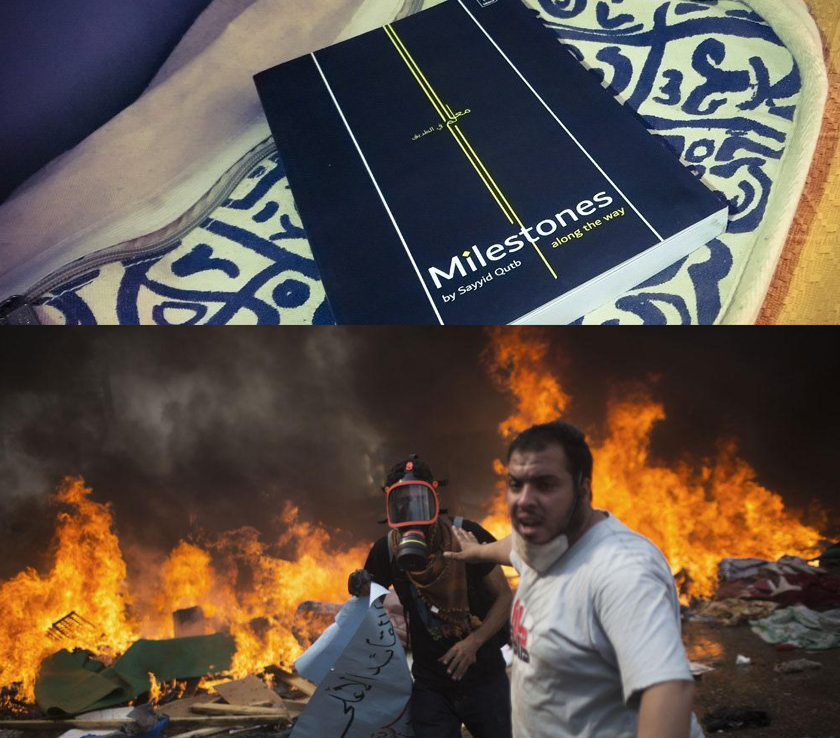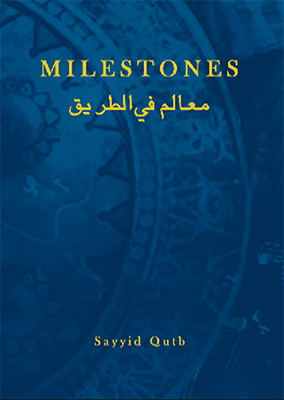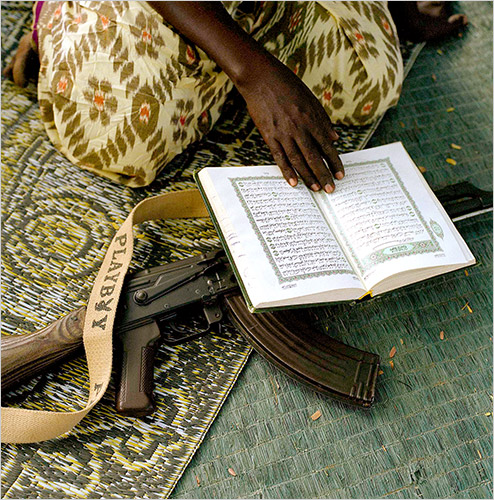How did a poorly-written book, full of redundancies, and mostly unoriginal ideas ignite a global violent movement? How did a child of rural Egypt and a middle-class teacher become the founder of jihadism and one of the most influential ideologues of the Islamic movement?
Qutb (pronounced coo-tub) was born in an Egyptian village in 1906. In the early 1930s, he started a career as a teacher and was sent on a two-year scholarship by the Ministry of Education to the United States, from 1948 to 1950. There he would study the US educational system while living in Colorado. It was a period of a great culture shock for him. Even though that period was known for its conservatism, especially in the Midwest, and it was long before the ’60s sexual revolution, he still found America decadent. The single man saw sexual sins everywhere, even in social events of rural churches. He was appalled at American materialism, “excessive” freedoms, the mixing of sexes, lack of spirituality, racism, rough sports like wrestling and football, bad haircuts and Jazz music! His faith provided him consolation during that period. It should be noted that, although he became radicalized while living in USA, his Islamic transformation had already started before his trip abroad.
When he returned home to Cairo, Egypt, his alienation never subsided. In fact, it intensified. His home country was becoming Westernized, and moving further from its conservative Islamic heritage, at least the urban society. Right after his return, he resigned from his job, joined the Muslim Brotherhood and became an editor for their official propaganda magazine. In 1952, the pro-Western monarchy was overthrown and a group of young military officers took over the government. The Brotherhood expected inclusion in the new government as payback for their support of the military officers. By the time, the military strongman Gamal Abdel Nasser took charge of the nation in 1954, it was clear that they were to be marginalized. They felt betrayed. From that point on, and towards 1964, Qutb formulated ideas about the necessity of a jihad (holy war) against the un-Islamic government. He, and other “Brotherhood” members, were arrested and accused of a plot to assassinate Nasser in 1954. During his time in prison, he wrote his most influential book, Milestones. He was released in 1964, only to get rearrested the following year and executed by hanging in 1966.
After his execution, his followers glorified him a martyr who refused to submit to the tyrannical government. He’s considered by members of Muslim Brotherhood as influential to their ideology as their founder, Hassan al-Banna (1906-1949). Qutb’s ideas have inspired several generations to take up arms and kill indiscriminately. Ayman al-Zawahiri, aged 15 when Qutb’s was assasinated, mourned his death. He would grow into a co-founder of Al-Qaeda, with Osama bin Laden. Indeed, Qutb is the intellectual godfather of Islamic fighters.
Anti-Muslim bigots and extremist Muslims would rather you equate both. However, Islam is the faith and Islamism is “political Islam.” The political vision of Muslim fundamentalists includes an implementation of Shari’ah (also Shariah or Sharia) as its cornerstone. Fierce critics of Islam and Islamists themselves claim that Islam is all political. Even if we assume that this claim is correct, millions of Muslims are opposed to turning their religion into a political campaign. Supporting these Muslims necessitates that we distinguish between a Muslim and an Islamist. (Read more on the six types of Muslims).
This book could be described as “the Islamist manifesto” which would be accurate considering that it demands for enforcing Shari’ah. However, “the jihadi manifesto” is more accurate as it’s also a call for arms against those who oppose that vision. Every time you encounter the radical author’s mention of “Islam,” it’s most likely that he’s not referring to the religion as a whole, but “Islamism” or “political Islam.”
Below are the most important excerpts from his book, Milestones:
What is wrong with the world today?
The famous introduction of Qutb’s book regarding an impending global annihilation is a reference to the 1960s nuclear standoff between USA and USSR, a conflict that does not affect or concern his vision. In the first few pages, he briefly denounces socialism, capitalism and Western democracy.
Mankind today is on the brink of a destruction, not because of the danger of complete annihilation, which is hanging over its head – this being just a symptom and not the real disease – but because humanity is devoid of those vital values which are necessary not only for its healthy development but also for its real progress. […]
Democracy in the West has become infertile to such an extent that it is borrowing from the systems of the Eastern bloc, especially in the economic system, under the name of socialism. It is the same with the Eastern bloc. Its social theories, foremost among which is Marxism, in the beginning attracted not only a large number of people from the East but also from the West, as it was a way of life based on a creed. But now Marxism is defeated on the plane of thought, and if it is stated that not a single nation in the world is truly Marxist, it will not be an exaggeration. […]
It is essential for mankind to have new leadership. 1Sayyid Qutb, Milestones, edited by A.B. al-Mehri (Birmingham, United Kingdom: Maktabah Booksellers and Publishers, 2006), 23.
He calls democracy intellectually bankrupt because he believes it borrows from socialism. That’s a reference to Western economic reforms in favor of better work conditions, workers’ rights and allowing the formation of unions.
1. We live in Jahiliyyah
Sayyid Qutb considered all societies, Muslim and non-Muslim alike, in Jahiliyyah, i.e. in ignorance of Islam, not unlike the state of Arabs before the advent of the prophet. That was not an original idea to Qutb. Several scholars have used it since the rise of Islam. For example, Ibn Taymiya in the 14th century used that label to denounce enemies of Islam and justify waging war on them. Muhammad ibn Abd al-Wahhab, to whom Wahabism is credited, also used that concept to start a puritanical Salafi movement in the 18th century. What’s unusual about that term is that it was not meant to be used after humanity had been enlightened by the revelation of Islam. Pakistani Islamist Abul A’la Maududi, who was contemporary to Qutb, was the first modern-day writer to use that accusation (Jahiliyyah) in denouncing a Muslim society where government refuses to rule by Shari’ah. Qutb was heavily influenced by his writings. In that sense, Maududi and Qutb equate modernity with Jahiliyyah: Modernity IS “ignorance”!
Qutb introduced Maudidi’s idea in Arabic language to a new audience in the Arab world. He also made it central to his vision. For Maududi, rulers and politicians, who did not support Shari’ah, were the main target of criticism. Qutb followed the same thought but emphasized that the Muslim society itself, the innocent men and women, are guilty for not rising up to their Jahili governments. That emphasis would have serious consequences as it built justification for terrorist attacks killing unarmed Muslims in their home countries. Moreover, Qutb highlighted that the definition of the word encompasses the whole world, Muslim and non-Muslim nations.
2. Sovereignty of Allah (Hakimiyyah) is not negotiable
Hakimiyyah means no governance except for Allah and no legislation except from Allah. Based on that, no society could be called Muslim unless Shari’ah is enforced. This theme is directly associated with the previous one and has also been presented by other pre-Qutb scholars including Maududi.
3. An Islamic vanguard (Tali’a) should wage a jihad
The idea of an Islamic vanguard taking over the state, regardless of the method, was not original to Qutb. In fact, the organization in which Qutb was a leading member, the Muslim Brotherhood, was founded for that aim by Hassan al-Banna. The Brotherhood, however, was notoriously deceptive about their method of becoming the rulers. They understood that publicly condoning violence would land them in trouble with the Egyptian government. Qutb, on the other hand, at a great personal price, blatantly called for waging violent attacks against personnel and institutions of all un-Islamic governments. In brief, Qutb’s most important intellectual contribution was his redefinition of jihad from a struggle against an external infidel enemy to an offensive against anyone, including “wayward Muslims” in order to establish an Islamist state that imposes Shari’ah on everyone, even the non-believers. This was Qutb’s most influential and most dangerous original idea.
Comparing Western culture with Islamic culture
His observations about the West were based on his experiences from the two-year period he spent in Colorado, USA.
Look at this capitalism with its monopolies, its usury and whatever else is unjust in it; at this individual freedom, devoid of human sympathy and responsibility for relatives except under the force of law; at this materialistic attitude which deadens the spirit; at this behaviour, like animals, which you call ‘free mixing of the sexes,’ at this vulgarity which you call ’emancipation of women,’ at these unfair and cumbersome laws of marriage and divorce, which are contrary to the demands of practical life; and at Islam, with its logic, beauty, humanity and happiness. 2Ibid., 155.
Note that usury is a contentious issue for Islamists like Qutb since “bank interest” is prohibited according to Shari’ah.
In Qutb’s eccentric mind, American men and women in the 1940s were having sex “like animals.” He even claimed (below) that sex without marriage and homosexuality were socially acceptable which was false for that period.
Qutb: Muslims should reject Western culture
He considers Islam almost extinct in the modern world and in need of revival.
If Islam is again to play the role of the leader of mankind, then it is necessary that the Muslim community be restored to its original form. It is necessary, to revive that Muslim community which is buried under the debris of the manmade traditions of several generations, and which it crushed under the weight of those false laws and customs which are not even remotely related to the Islamic teachings, and which, in spite of all this, calls itself the ‘world of Islam.’ 3Ibid., 25.
In the author’s view, Muslims have been corrupted with foreign ideas and customs.
We are also surrounded by Jahiliyyahh today, which is of the same nature as it was during the first period of Islam, perhaps a little deeper. Our whole environment, people’s beliefs and ideas, habits and art, rules and laws is Jahiliyyahh, even to the extent that what we consider to be Islamic culture, Islamic sources, Islamic philosophy and Islamic thought are also constructs of Jahiliyyahh.
We must also free ourselves from the clutches of Jahili society, Jahili concepts, Jahili traditions and Jahili leadership. Our mission is not to compromise with the practices of Jahili society, nor can we be loyal to it. 4Ibid., 34.
His verdict is, despite the efforts of contemporary Islamic scholars, there is no middle ground between Islam and non-Islamic ideas.
Qutb: The coexistence of Islam and modern civilization is impossible
Islam cannot accept any mixing with Jahiliyyahh, either in its concept or in the modes of living which are derived from this concept. Either Islam will remain, or Jahiliyyahh: Islam cannot accept or agree to a situation which is half-Islam and half-Jahiliyyahh. 5Ibid., 146.
Many extremists today reflect the same line of thought in the statement above: one must destroy the other, either Islam or modern civilization will “remain.” Both can not survive!
Qutb: Islam’s goal is to abolish all other systems and governments
[Islam] strives from the beginning to abolish all those systems and governments which are based on the rule of man over men and the servitude of one human being to another. When Islam releases people from this political pressure and presents to them its spiritual message, appealing to their reason, it gives them complete freedom to accept or not to accept its beliefs. 6Ibid., 70.
Qutb: Democracy is incompatible with Islam
[T]hey present Islam to the people under the names of ‘Islamic Democracy’ or ‘Islamic Socialism’, or sometimes by saying that the current economic or political or legal systems in the world need not be changed except a little to be acceptable Islamically. The purpose of all this rationalization is to appease people’s desires! 7Ibid., 150.
The irony in Qutb criticism of any reconciliation between Islam and modern schools of thought, is that the group that he belongs to was founded based on that principle. Extremists, like the co-founder of al-Qaeda Ayman al-Zawahiri, after they “graduate” from the Muslim Brotherhood, accuse other Brothers of betraying Qutb’s teachings by worshiping the “Western idol” of Democracy, a system based on the rule of the majority, rather than Allah’s Shari’ah. To this day, Islamists, including some in the Brotherhood, argue whether “Islamic Democracy” should be pursued. Of course, jihadis like Qutb consider such democratic rituals like running elections and casting votes worthless.
The Muslim Brotherhood was founded by schoolteacher Hassan al-Banna in 1928. They were opposed to the ongoing Westernization of Egyptian and other Muslim societies, and called for the restoration of Islamic values and Shari’ah. Continue reading.
Fornication and homosexuality: Qutb’s sex-obsessed view of Western culture
In these [Western] Societies, illegitimate sexual relationships, even homosexuality, are not considered immoral. The meaning of ethics is limited to economic affairs or sometimes to political affairs which fall into the category of ‘government interests’. For example, the scandal of Christine Keeler and the British minister Profumo was not considered serious to British society because of its sexual aspect; it was condemnable because Christine Keeler was also involved with a naval attaché of the Russian Embassy, and thus her association with a cabinet minister lied before the British Parliament! […] These affairs are not considered immoral because of sexual deviations, but because of the danger to state secrets!
Among Jahili societies, writers, journalists and editors advise both married and unmarried people that free sexual relationships are not immoral. However, it is immoral if a boy uses his partner, or a girl uses her partner, for sex, while feeling no love in his or her heart. It is bad if a wife continues to guard her chastity while her love for her husband has vanished; it is admirable if she finds another lover. Dozens of stories are written about this theme; many newspaper editorials, articles, cartoons, serious and light columns all invite to this way of life. 8Ibid., 111.
Profumo affair was a 1960s British scandal in the heyday of the Cold War; a cocktail of sex, espionage and intrigue. British defence minister, John Profumo, was sleeping with a high-end 19-year-old prostitute, Christine Keeler, who was also sleeping with the Soviet spy and naval attaché, Eugene Ivanov. Profumo initially lied about the affair. Eventually, the scandal ended the Conservative politician’s career. It also ruined the political career of the Prime Minister, Harold Macmillan, and brought down the Conservative party in the elections of the following year.
Qutb’s description of the affair is accurate. The damage that followed the scandal was more about Profumo’s lies to the public and the vulnerability of state secrets, than the illicit relationship.
On woman’s “maternal duty” between work and family
If the family is the basis of the society, the basis of the family is the division of labour between husband and wife, and the upbringing of children is the most important function of the family, then such a society is indeed civilized. […] If, on the other hand, free sexual relationships and illegitimate children become the basis of a society, and if the relationship between man and woman is based on lust, passion and impulse, and the division of work is not based on family responsibility and natural gifts; if woman’s role is merely to be attractive, sexy and flirtatious, and if the woman is freed from her basic responsibility of bringing up children; and if, on her own or under social demand, she prefers to become a hostess or a stewardess in a hotel or ship or air company, thus spending her ability for material productivity rather than in the training of human beings, because material production is considered to be more important, more valuable and more honourable than the development of human character, then such a civilization is ‘backward’ from the human point of view, or ‘Jahili’ in the Islamic terminology. 9Ibid., 110.
Qutb: The only truly civilized society is the Islamic one, under Shari’ah
In a play of words, Qutb assures Muslims, they are not actually “backwards.” It’s the developed nations who are backwards:
The Islamic society is, by its very nature, the only civilized society, and the Jahili societies, in all their various forms, are backward societies. 10Ibid., 107.
Shar’ah will “regulate” all facets of life, not just the legal
[L]egislation is not limited only to legal matters, as some people assign this narrow meaning to the Shari’ah. The fact is that attitudes, the way of living, the values, criteria, habits and traditions, are all legislated and affect people. 11Ibid., 108.
For Islamists, like Qutb, Shari’ah (Islamic law) is almost more important than faith itself! For them, “submission” to Allah’s laws is fundamental to Islam. Keep reading….
The Western scheme against Muslims
Enmity towards the West among Middle Eastern intellectuals in the mid-20th century, from Islamists or old-school communists, is no surprise, if Western countries who preach freedom are seen as imperialists and colonizers. Even after de-colonization, Western governments continued to dominate Muslims through their puppet states. Although Qutb was not the first Muslim writer to express hatred towards the West, he was probably the first to point at USA as the “Great Satan.” Before then, it was England or France. During the 1950s and ’60s, while Qutb was radicalizing, the United States was emerging as a superpower.
The Western ways of thought and all the sciences started on the foundation of these poisonous influences with an enmity towards all religions [a reference to the historic conflict between science and and the Church], and in particular with greater hostility towards Islam. This enmity towards Islam is especially pronounced and many times is the result of a well thought out scheme, the object of which is first to shake the foundations of Islamic beliefs and then gradually to demolish the structure of Muslim society. 12Ibid., 128.
Blaming internal problems on external agents (the West) has protected (or paralyzed) Muslim intellectuals from self-criticism for decades. “The West” became the enemy whose main mission is to lead Muslims away from their faith. American and Zionist conspiracy theories are rife among Muslims today and have become part of the collective psyche. You realize conspiracies reached a bizarre stage when Coca-Cola had to deny that their logo reads “no Mohammad, no Mecca” in Arabic when reversed. Their soft beverage rival was not spared either: Several clerics spread the rumour that Pepsi stands for “Pay Every Penny to Save Israel.” One could say that such an absurd rumour has origins in Qutb’s book, where he spoke about the schemes of “world Jewry” (below), in perhaps one of the earliest mentions in contemporary Islamic literature of Jews running a global organization to undermine their faith and society.
The Jewish scheme against Muslims
[O]ne of the tricks played by world Jewry […] is to eliminate all limitations, especially the limitations imposed by faith and religion, so that the Jews may penetrate into body politic of the whole world and then may be free to perpetuate their evil designs. At the top of the list of these activities is usury, the aim of which is that all the wealth of mankind ends up in the hands of Jewish financial institutions which run on interest. 13Ibid., 123.
Qutb could have expressed anger towards the young nation of Jews at the time of his writing, that is Israel. But he chose to condemn “all” Jews.
The entire world is Jahili (apostate)
The Jahili society is any society other than the Muslim society; and if we want a more specific definition, we may say that any society is a Jahili society which does not dedicate itself to submission to Allah alone, in its beliefs and ideas in its observances of worship, and in its legal regulations.
According to this definition, all the societies existing in the world today are Jahili.14Ibid., 91.
In Qutb’s language, “submission to Allah” is often synonymous with “living under Allah’s laws,” i.e. Shari’ah.
The Islamist writer did not harbor contempt for only Western nations, but also for Far Eastern and African nations.
All idolatrous societies are also among the Jahili societies. Such societies are found in India, Japan, the Philippines and Africa. Their Jahili character consists first of the fact that they believe in other gods besides Allah Almighty, in addition to Him or without Him; second, they have constructed an elaborate system of devotional acts to propitiate these deities. Similarly, the laws and regulations which they follow are derived from sources other than Allah and His Law. […]
All Jewish and Christian societies today are also Jahili societies. 15Ibid.)
All existing Muslim nations are un-Islamic, Jahili societies
[A]ll the existing so-called ‘Muslim’ societies are also Jahili societies. We classify them among Jahili societies […] because their way of life is not based on submission to Allah alone. Although they believe Tawhid (monotheism), still they have relegated the legislative attribute of Allah Almighty to others and submit to this authority, and from this authority they derive their systems, their traditions and customs, their laws, their values and standards, and almost every practice of life.
Allah Most High says concerning the rulers:
“……..And whoever does not judge by what Allah has revealed, then it is those who are the disbelievers.” 16Ibid., 93.
The above Quranic verse above, from Surah Al-Ma’idah, is a challenging one for a non-Islamist Muslim to argue with. The Quran is considered the literal word of Allah. An Islamist (a supporter of political Islam) applying that verse literally to Muslim rulers today would demonstrate that almost all of them are apostates. The jihadi (the militant Islamist) would go one step further and remind the listeners that the punishment of apostasy is death penalty. That line of thinking ignores other verses that speak of “no compulsion in religion” and builds sympathy among the Muslim public when those in power are attacked or assassinated.
[T]hese people call themselves Muslims or their birth certificates register them as Muslims. The people ought to know that Islam means to accept the creed “La ilaha illa Allah” [There is no god but Allah] in its deepest sense, which is this: that every aspect of life should be under the sovereignty of Allah, and those who rebel against Allah’s sovereignty and usurp it for themselves should be opposed. 17Ibid., 48.
Pan-Islamism vs. pan-Arabism
Qutb derided Arab nationalism (unity of all Arabs) when it was the dominant ideology, at a time when it was promoted in song and films. It did not help that it was an initiative by President Nasser; the leader who made Islamists his enemy. The main reason behind Islamist rejection of Arab nationalism is that Islam is not central to the ideology.
Islam based the Islamic society on the association of belief alone, instead of the low associations based on race and colour, language and country, regional and national interests. […]
In this great Islamic society Arabs, Persians, Syrians, Egyptians, Moroccans, Turks, Chinese, Indians, Romans, Greeks, Indonesians and Africans were gathered together – in short, peoples of all nations and all races. […] This marvellous civilization was not an ‘Arabic civilization’, even for a single day; it was purely an ‘Islamic civilization’. It was never a ‘nationality’ but always a ‘community of belief.’ 18Ibid., 59.
The great irony here is that Islamists do not wish to replace the dream of pan-Arabism with independent sovereign states, but with pan-Islamism: a much stricter union under the same Shari’ah where regional cultural differences will be scorned and minorities will be barely tolerated.
At the beginning of the 20th century, while the Ottoman Empire was weakening, Arabic-speaking peoples were becoming more conscious of their identity. Continue reading.
An international movement that does not recognize borders or nations
Qutb was not only against Arab nationalism, but nationalism period:
The fatherland is that place where the Islamic faith, the Islamic way of life, and the Shari’ah of Allah is dominant; only this meaning of ‘fatherland’ is worthy of the human being. Similarly, ‘nationality’ means belief and a way of life, and only this relationship is worthy of man’s dignity. 19Ibid., 141.
Increasingly someIslamists and clerics are declaring in public that they do not recognize in the borderlines between Muslim countries. That was evident when ISIS (Islamic State of Iraq and Syria) celebrated the partial removal of the border between Syria and Iraq in 2014, declaring that the “Sykes-Picot Borders” have been removed. The Islamist claim is not mistaken that some borderlines seem artificial and arbitrary, drawn by a European elite who knew, or cared, little about the ancient peoples living around them.
The homeland of the Muslim, in which he lives and which he defends, is not a piece of land; the nationality of the Muslim, by which he is identified, is not the nationality determined by a government; the family of the Muslim, in which he finds solace and which he defends, is not blood relationships; the flag of the Muslim, which he honours and under which he is martyred, is not the flag of a country; and the victory of the Muslim, which he celebrates and for which he is thankful to Allah, is not a military victory.20Ibid., 140.
Islamic view of scientific and philosophical studies
No doubt Islam permits a Muslim to learn chemistry, physics, astronomy, medicine, technology and agriculture, administration and similar technical sciences from a non-Muslim or from a Muslim who is not pious, and this under the condition that no god-fearing Muslim scientists are available to teach these sciences. 21Ibid., 124.
But…
Philosophy, the interpretation of history, psychology (except for those observations and experimental results which are not part of anyone’s opinion) ethics, theology and comparative religion, sociology (excluding statistics and observations) – all these sciences have a direction which in the past or the present has been influenced by Jahili beliefs and traditions. That is why all these sciences come into conflict, explicitly or implicitly, with the fundamentals of any religion, and especially with Islam. 22Ibid., 122.
What science owes to Islamic civilization?
One ought to remember the fact that the experimental method, which is the dynamic spirit of modern Europe’s industrial culture, did not originate in Europe but originated in the Islamic universities of Andalusia and of the East. […] Later, by adopting the experimental method, Europe entered into the period of scientific revival, which led it step by step to great scientific heights. 23Ibid., 124.
That is true! One of the earliest natural philosophers to understand the Scientific Method was the Arab physician Ibn al-Haytham (965-1040), several centuries before the Scientific Revolution.
A revolutionary vanguard (Tali’a) and jihad: How to start the Islamic movement?
It is necessary that there should be a vanguard which sets out with this determination and then keeps walking on the path, marching through the vast ocean of Jahiliyyahh which has encompassed the entire world. 24Ibid., 27.
It’s very likely that Qutb’s “vanguard” idea was inspired by Leninism from the early 20th-century. The communist vanguard are the most dedicated and best educated members in the movement who would lead the revolution and protect its victories after. They’re also a political party (the Bolsheviks) who ruled the post-revolution nation. Islamist groups throughout the 20th century, both armed and unarmed, were initially inspired by such “vanguard” ideas which gave rise to the Muslim Brotherhood, Al-Qaeda and ISIS (Islamic State of Iraq and Syria).
Break away from the Jahili society
The Islamist author is giving up on exclusively educating Muslims. He calls on his followers to separate from their society. He’s also challenging other Islamists (below) who reject violence and claim that they’re preachers, rather than fighters:
It is therefore necessary that Islam’s theoretical foundation – belief – materialize in the form of an organized and active group from the very beginning. It is necessary that this group separate itself from the Jahili society, becoming independent and distinct from the active and organized Jahili society whose aim is to block Islam. The centre of this new group should be a new leadership; the leadership which first came in the person of the Prophet himself, and after him was delegated to those who strove for bringing people back to Allah Almighty’s sovereignty, His authority and His laws. […]
Islam was founded in this manner. It was founded on a creed which, although concise, included the whole of life. This creed immediately brought into action a viable and dynamic group of people who became independent and separate from the Jahili society, immediately challenging it; it never came as an abstract theory devoid of practical existence. And, in the future it can be brought about only in this manner. There is no other way for the revival of Islam in the shade of Jahiliyyahh, in whatever age or country it appears, except to follow its natural character and to develop it into a movement and an organic system. 25Ibid., 58.
Breaking away from society has been the modus operandi of many jihadi organizations, like ISIS in Syria, Al-Qaeda in Afghanistan, or Abu_Sayyaf in the Phillipines. They’re physically separated from their homes and their time is split between combat training and hate-filled religious lessons.
They’re coming after you: The Islamic vanguard should prepare for war
[H]istory tells us that the Jahili society chooses to fight and not to make peace, attacking the vanguard of Islam at its very inception, whether it be a few individuals or whether it be groups, and even after this vanguard has become a well-established community. 26Ibid., 90.
Qutb: Those who resist the Islamic movement should be killed!
[Islam] is a universal message which the whole of mankind should accept or make peace with. No political system or material power should put hindrances in the way of preaching Islam. It should leave every individual free to accept or reject it, and if someone wants to accept it, it should not prevent him or fight against him. If someone does this, then it is the duty of Islam to fight him until either he is killed or until he declares his submission. 27Ibid., 66.
Jihad is a call to arms to fight the enemies of Islam
This movement uses the methods of preaching and persuasion for reforming ideas and beliefs, and it uses physical power and jihad for abolishing the organizations and authorities of the Jahili system which prevents people from reforming their ideas and beliefs, but forces them to obey their erroneous ways and make them serve human lords instead of the Almighty Lord. This movement does not confine itself to mere preaching to confront physical power, as it also does not use compulsion for changing the ideas of people. 28Ibid., 65.
Qutb is responding to fellow Muslims who won’t join the fight by saying that Allah’s great message to free humanity could not logically be achieved strictly through education. Violence will be required! But he clarifies, only those who “get in the way” will be fought. However, he claims, others will not be forced to join Islam. (It’s their choice to become second-class citizens!)
It would be naive to assume that a call is raised to free the whole of humankind throughout the earth, and it is confined to preaching and exposition. Indeed, it strives through preaching and exposition when there is freedom of communication and when people are free from all these influences, as ‘there is no compulsion in religion’; but when the above mentioned obstacles and practical difficulties are put in its way, it has no recourse but to remove them by force so that when it is addressed to peoples’ hearts and minds they are free to accept or reject it with an open mind.
Since the objective of the message of Islam is a decisive declaration of man’s freedom, not merely on the philosophical plane but also in the actual conditions of life, it must employ Jihad. 29Ibid., 72.
In Islam, there are three types of people
Now the people of the whole world were of three kinds: one, the Muslims who believed in [Allah]: two, those with whom [the Prophet] had peace [Dhimmis, Christians and Jews, who agree to pay a tax, Jizzyah, to live under the Islamic state]; and three, the opponents who kept fighting him. 30Ibid.
Qutb: How to present Islam to non-believers
We need not rationalize Islam to them; need not appease their desires and distorted concepts. We will be extremely outspoken with them: “The ignorance in which you are living makes you impure, and Allah wants to purify you; the customs which you follow are defiling, and Allah wants to cleanse you; the life you are living is low, and Allah wants to uplift you; the condition which you are in is troublesome, depressing and base, and Allah wants to give you ease, mercy and goodness. Islam will change your concepts, your modes of living and your values; will raise you to another life so that you will look upon the life you are now living with disgust.” 31Ibid., 150.
Qutb: Jihad is required from every Muslim
Most Muslims understand that jihad belongs to certain historical period in time or at least it could be brought back in defense of their homelands. Qutb finds this definition a sign of weakness and references two verses from the Quran in support of his argument:
“……And fight against the disbelievers collectively as they fight against you collectively. And know that Allah is with the righteous.”
“Fight those who do not believe in Allah or in the Last Day and who do not consider unlawful what Allah and His Messenger have made unlawful and who do not adopt the religion of truth (i.e. Islam) from those who were given the Scripture – (fight) until they give the Jizyah (tax) willingly while they are humbled.” […]
With these verses from the Qur’an and with many Traditions of the Prophet in praise of jihad, and with the entire history of Islam, which is full of Jihad, the heart of every Muslim rejects that explanation of jihad invented by those people. 32Ibid., 74.
Is jihad offensive or defensive warfare?
Those who say that Islamic jihad was merely for the defence of the ‘homeland of Islam’ diminish the greatness of the Islamic way of life and consider it less important than their ‘homeland’. This is not the Islamic point of view, and their view is a creation of the modern age and is completely alien to Islamic consciousness. 33Ibid., 82.
The homeland of Islam, to Qutb, is any territory where “preparation” for jihad is conducted and from which the fighters could launch their attacks:
[T]he defence of the ‘homeland of Islam’ is the defence of the Islamic beliefs, the Islamic way of life, and the Islamic community. However, its defence is not the ultimate objective of the Islamic movement of Jihad but is a means of establishing the Divine authority within it so that it becomes the headquarters for the movement of Islam, which is then to be carried throughout the earth to the whole of mankind, as the object of this religion is all humanity and its sphere of action is the whole earth. 34Ibid.
Note “the headquarters” above is the translation of the Arabic word “al-Qaeda” in the original text which could also be translated as “the base,” as in the base of jihad. There is no evidence that Bin Laden was using his intellectual godfather’s terminology to find a name for his group, however he meant to convey the same meaning.
Qutb: Besides the physical fight, other methods of support are welcome
Qutb understood that not everyone will be a combatant, there will be a need for those who finance, plan, train and shelter. For that, he uses yet another verse from the Quran:
Indeed, those who have believed (Imaan) and migrated (Hijrah) and fought (Jihad) with their wealth and their lives in the cause of Allah and those who gave shelter and aided them – they are allies of one another. 35Ibid., 132.
Jihad versus the internationally-recognized rules of war
The Islamic Jihad has no relationship to modern warfare, either in its causes or in the way in which it is conducted.36Ibid., 66.
Qutb: Don’t allow even your own parents to impede your jihad
[I]f they openly declare their alliance with the enemies of Islam, then all the filial relationships of a Muslim are cut off and he is not bound to be kind and considerate to them. 37Ibid., 133.
Jihad is not a battle for economic opportunities or political engagement
The enemies of the Believers may wish to change this struggle into an economic or political or racial struggle, so that the Believers become confused concerning the true nature of the struggle and the flame of belief in their hearts becomes extinguished. The Believers must not be deceived, and must understand that this is a trick. 38Ibid., 177.
The founder of jihadism was one step ahead of Western journalists and university professors who dig for the root causes of terrorism, by blaming colonization, poverty or poor education. Qutb, and other jihadis, insist that this struggle is about nothing but Islam itself and the establishment of Shari’ah.
Understanding the phenomenon of jihad sends professors looking into possible historical, political and sociological issues. Could it be that the West is to blame? Or is it Israel? Secular dictatorships? Or even the lack of sex?
Continue reading.
The Khalifah is the civil and religious leader of the Islamic state
Caliph or Khalifah is the successor and representative of the Prophet, and the head of the Islamic state. Qutb reminds Muslims with a verse from the Quran that once they rule over a territory, a Khalifah must be chosen. That job became prominent in recent years on the news after a jihadi called Abou Bakr al-Baghdadi was declared to be the Khalifah and leader of the Islamic State in Syria.
‘And when Your Lord said to the angels, ‘Indeed, I will make upon the earth a Khalifah (vicegerent)……,’ 39Ibid., 24.
Qutb did not dwell for long on that role in his book. Perhaps then he did not see it as central to the mission as it is seen today.
The Islamic state is not a theocracy
Islamists adamantly reject the idea that their State would be a theocracy:
The way to establish Allah Almighty’s rule on earth is not that some consecrated people, the priests, be given the authority to rule, as was the case with the rule of the Church, nor that some spokesmen of Allah Almighty become rulers, as is the case in a ‘theocracy’. To establish Allah’s rule means that His laws be enforced and that the final decision in all affairs be according to these laws. 40Ibid., 68.
The dictionary definition of theocracy is “a system of government in which priests rule in the name of God or a god.” It’s hard to comprehend how a system led by the Khalifah who represents Allah on earth is any different.
Diving the map between the “house of Islam” and the “house of war”
There is only one place on earth which can be called the home of Islam (Dar-ul-Islam), and it is that place where the Islamic state is established and the Shari’ah is the authority and Allah’s limits are observed, and where all the Muslims administer the affairs of the state with mutual consultation. The rest of the world is the home of hostility (Dar-ul-Harb). A Muslim can have only two possible relations with Dar-ul- Harb: peace with a contractual agreement, or war. A country with which there is a treaty will not be considered the home of Islam. 41Ibid., 132.
The basis for terrorist attacks within Muslim countries
Any country which fights the Muslim because of his belief and prevents him from practicing his religion, and in which the Shari’ah is suspended, is Dar-ul-Harb, even though his family or his relatives or his people live in it, or his capital is invested and his trade or commerce is in that country; and any country where the Islamic faith is dominant and its Shari’ah is operative is Dar-ul-Islam, even though the Muslim’s family or relatives or his people do not live there, and he does not have any commercial relations with it.42Ibid., 141.
And thus Muhammad fought against the city of Makkah, although it was his birthplace, and his relatives lived there, and he and his Companions had houses and property there which they had left when they migrated; yet the soil of Makkah did not become Dar-ul-Islam for him and his followers until it surrendered to Islam and the Shari’ah became operative in it. This, and only this, is Islam. 43Ibid., 140.
Jihad does not stop before victory is declared “throughout the earth”
[T]his struggle is not a temporary phase but an eternal state – an eternal state, as truth and falsehood cannot co-exist on this earth. […] It became incumbent upon Islam to strike back and release man throughout the earth from the grip of these usurpers. 44Ibid., 75.
The ultimate goal is a utopian one world Islamic empire, a confederation of states, under caliphates who enforce the Shri’ah.
The milestones on the path towards universal victory of Islam
The milestones are signs from Allah to fighters on their precarious path to establish his rule upon the entire earth:
It is necessary that this vanguard should know the landmarks and the milestones of the road toward this goal so that they may recognize the starting place, the nature, the responsibilities and the ultimate purpose of this long journey. […] The milestones will necessarily be determined by the light of the first source of this faith – the Holy Qur’an – and from its basic teachings.45Ibid., 28.
Qutb, while writing in prison, understood that he’s sending out his followers on a mission of blood and atrocities:
[True Muslims] will be able to see the milestones of the road clearly […] while traversing this road ever paved with skulls and limbs and blood and sweat, to find help and victory […] this world is not a place of reward. 46Ibid., 176.
Qutb assures Muslims that if Allah promised victory, then it’s guaranteed, even if it seems elusive. Fight for Allah, expect to suffer but you’ll be rewarded in heaven, he says. He provides evidence from the Quran itself, the “literal word of God”:
“So let those fight in the cause of Allah who sell the life of this world for the Hereafter. And he who fights in the cause of Allah and is killed or achieves victory – We will bestow upon him a great reward.” 47Ibid., 79.
The challenge with these “milestones” is that they are divine. Those who choose that dangerous mission can not tell whether (religiously) they’re going in the right direction or have gone astray. But there’s usually extremist clerics available to cheer them on!
What follows Islamic victory?
Qutb left some room for the victorious Islamist state to do business with infidels (traditionally labelled “polytheists”):
[T]here would be some give-and-take with the polytheists in commercial activity and daily business; yet relationships of understanding are one thing and daily business is something else. 48Ibid., 33.
What Islamists like Qutb ignore is how they would start implementing Shari’ah following victory. For example, at which point, during the Islamist takeover, will they finally turn Shari’ah into a complete legal body ready for practice, authority and judgement? Would they impose it in entirety including the brutal corporal punishments or will it be gradual? Many details are perhaps intentionally kept vague. It could also be that Islamists believe that these concerns are not worth addressing now. A system like Shari’ah is “perfect” that it could not go wrong:
Without doubt, we possess this new thing which is perfect to the highest degree, a thing which mankind does not know about and is not capable of producing. 49Ibid., 27.
If there is one statement in the book that summarizes what Islamists, Qutb included, believe, it’s the following:
[T]here is only one true system, and that is Islam; all other systems are Jahiliyyahh [Ignorance]. 50Ibid., 131.
You might also like:

Milestones: The jihadi manifesto in 10 photos
Photos show how a 1964 text laid the foundations of Islamic terrorism
BOOK: MILESTONES

Six types of Muslims in one diagram: Mainstream, Islamists and Jihadists
What is the difference between a Jihadi, a Wahabi and a Salafi Muslim?
BOOK: MILESTONES
Endnotes








